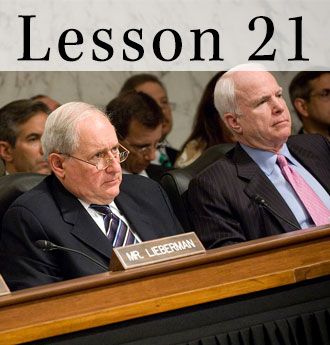The Resource Center » Level 3 » Unit 4 »
Lesson 21: What is the Role of Congress in American Constitutional Democracy?

Lesson Purpose
Lesson Objectives
- explain basic differences between Congress and the British Parliament and how Congress reflects America’s commitment to representative government and federalism,
- identify several constitutional sources of congressional power,
- identify some of the challenges that members of Congress face in representing and serving their constituents, and
- to evaluate, take, and defend positions on contemporary issues about congressional representation and organization.
Lesson Terms
delegate theory of representation
Lesson Biographies
Lesson Court Cases
Case Summary
Section 3 of the National Industrial Recovery Act empowered the president to implement industrial codes to regulate weekly employment hours, wages, and minimum ages of employees. The codes had standing as penal statutes.
Question(s)
Did Congress unconstitutionally delegate legislative power to the president?
Answer(s)
The Court held that Section 3 was "without precedent" and violated the Constitution. The law did not establish rules or standards to evaluate industrial activity. In other words, it did not make codes, but simply empowered the president to do so. A unanimous Court found this to be an unconstitutional delegation of legislative authority.
See: The Oyez Project, Schechter Poultry Corp. v. United States, 295 U.S. 495 (1935)
Lesson Primary Sources
From Wikipedia: Federalist No. 51 is an essay by James Madison, published on February 6, 1788. No. 51 addresses means by which appropriate checks and balances can be created in government. This is one of the most often quoted Federalist Papers for its arguments in favor of separation of powers.






